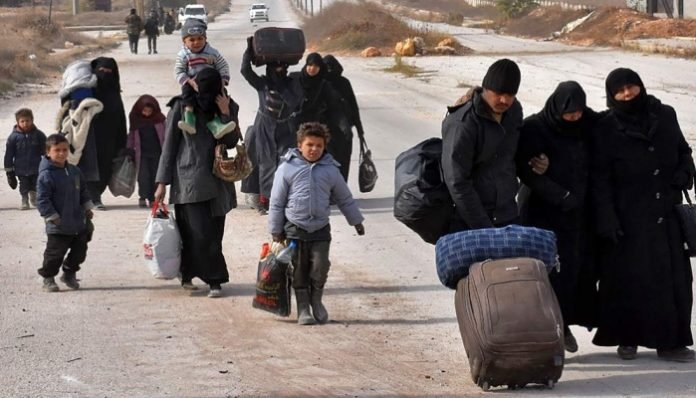Syrians and Afghans in Turkey face detention, abuse and deportation using EU-financed facilities and equipment, according to a new investigation published on Friday, Turkish Minute reported.
The European Union has poured hundreds of millions of euros into a deportation infrastructure in Turkey that has locked up Syrian and Afghan refugees in dire conditions and forcibly deported them to dangerous situations — with the EU flag visible at every step, an investigation by Lighthouse Reports and multiple media outlets has found.
Turkey, home to millions of refugees from Afghanistan and Syria, has deported hundreds of thousands in recent years, partly using a system funded by the EU. While the bloc cannot deport Syrians or Afghans directly to their home countries due to international laws prohibiting returns to places of danger, the EU has worked with Turkey to create a buffer zone outside its borders, funneling nearly €1 billion into migration control since 2014.
The investigation — involving Politico, El País, Der Spiegel and others — documents €213 million in EU funding for the construction, refurbishment and maintenance of approximately 30 “removal centers” in Turkey, where detainees face overcrowded, unsanitary conditions, abuse and even torture. Refugees are often violently coerced into signing documents that falsely declare their desire to “voluntarily” return to their home countries.
Detainees described beatings, being kept in refrigerator rooms for up to 12 hours and forced deportations. Testimonies from those detained reveal systematic abuse and disregard for basic human rights, which EU officials have been repeatedly warned about but have chosen to ignore.
Turkey has 32 removal centers with a capacity of nearly 20,000 people. According to documents reviewed, EU funds were spent on facilities and equipment including barbed wire fences, security cameras, fingerprinting systems and even baby clothes. While the EU argues that its assistance was meant to improve conditions in these centers, refugees report that EU-funded supplies, such as soap and pillows, were often withheld.
The investigation also found that detainees had their belongings confiscated, including their phones, making it nearly impossible to contact lawyers or family members. Access to legal support was restricted, with only 21 percent of detainees in 2022 managing to secure a lawyer, according to internal EU data. Many refugees were left without representation as they were coerced into signing forms under threat of violence.
One detainee, Abdul, a 28-year-old Syrian, described being detained while shopping in Turkey. He was held in a Kayseri removal center, where detainees were regularly beaten and subjected to extreme conditions, including confinement in a refrigerated room. He eventually signed a “voluntary return” document after being physically beaten. Abdul and his family now live in Idlib, Syria, a region controlled by a group deemed “terrorist” by the EU.
Despite extensive evidence of abuse, senior EU officials have repeatedly ignored concerns. European diplomats and former EU officials told the investigation team that issues related to human rights abuses and forced deportations had been systematically erased from official EU reports. “Everybody knows. People are closing their eyes,” said one former EU official.
The EU-Turkey migration deal, signed in 2016, has turned Turkey into the EU’s main partner in curbing migration flows from the Middle East to Europe. Since then, the Turkish government has increasingly transformed EU-funded infrastructure into tools for mass deportation. Recep Tayyip Erdogan’s administration has emphasized its desire to reduce the number of refugees in Turkey, often using EU funding for these efforts.
Interior Minister Ali Yerlikaya has described removal centers as “our greatest infrastructure power regarding deportation.” He stated that Turkey’s deportation figures have surpassed those of all EU countries, with more than 715,000 Syrians “voluntarily” returned since 2016. However, testimonies and court rulings, including from the European Court of Human Rights, reveal that many of these returns are anything but voluntary.
Sami, a 26-year-old Syrian, said he was detained by Turkish police, who confiscated his identification and took him to a removal center. After being beaten and denied medical care, he was eventually deported to Syria. “The EU flag is everywhere,” he said. “On doors, windows, soap bags, even on mattresses and pillows.”
The investigation also found EU logos on vehicles used by Turkish authorities for mass arrest operations and deportations. These vehicles, part of a fleet originally funded by an EU project in 2015, have been repurposed to transport detainees to Syria and Afghanistan. Despite EU regulations prohibiting forced deportations to conflict zones, Turkey has deported many Afghans directly to Taliban-controlled areas, leading to deadly outcomes for some.
While Brussels claims to be monitoring how EU funds are used in Turkey, several diplomats and EU officials have stated that oversight is minimal. “There have always been concerns about human rights” regarding funding for Turkey, a former commission official said. Yet, there has been little concrete action to address abuses or withdraw funding. Instead, in recent years, the EU has increased funding for migration control projects in Turkey, with over €260 million in projects approved since 2022.
“European leaders are fully aware of what is going on; they just don’t want to get their hands dirty,” said Emma Sinclair, a representative from Human Rights Watch. “The EU is indirectly facilitating forced returns. They subcontract human rights violations to third countries.”
The report underscores the complicity of European countries in a system that violates international human rights standards. As Turkey continues to serve as the EU’s de facto deportation partner, refugees, including women and children, are left to bear the brunt of an abusive system built and maintained with European taxpayer money.















